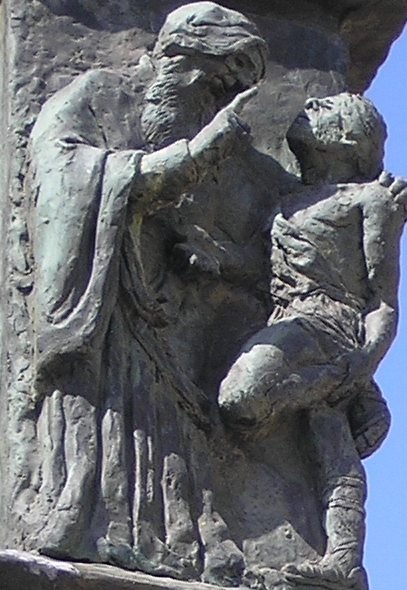Doers of the Word

It has been said that the great Jewish rabbi Hillel was asked if he could explain the Torah (the Pentateuch; the first five books of the Hebrew and Christian Scriptures) while standing on one foot. He accepted the challenge and said: “What is hateful to you, do not do to your fellow: this is the whole Torah; the rest is explanation.” This is the negative or prohibitive form of what has become widely known as the Golden Rule: “treat others as you would like others to treat you.” In one form or other the Golden Rule is found in many religions and embodies the ethic of relationships within Alcoholics Anonymous and self help groups based upon its Twelve Steps.
Christianity gives Jesus credit for stating the positive sense in Matthew 7:12 of the Sermon on the Mount: “So whatever you wish that others would do to you, do also to them, for this is the Law and the Prophets.” Jesus in effect was saying the golden rule was a summary of the entire Old Testament. Leon Morris said in his commentary on Matthew: “The person who consistently lives according to the golden rule is keeping all the regulations in Scripture directing one’s conduct toward other people.” There is no getting around it: if you are a follower of Jesus, you are to be actively doing good to others.
Jesus states both the Golden Rule and the two greatest commandments can be seen as summaries of the Hebrew Scriptures—the Law and the Prophets. In Matthew 22:34-40 Jesus was challenged by a Pharisee to give the great commandment of the Law—to summarize the law in one commandment. His response was to say there were two great commandments. The first one was: “You shall love the Lord your God with all your heart and with all your soul and with all your mind.” And the second one was: “You shall love your neighbor as yourself.” He then declared: “On these two commandments depend all the Law and the Prophets.”
In the Sermon on the Mount Jesus said he came to fulfill, not abolish the Law and the Prophets. He repeatedly sharpened and clarified for his listeners various teachings in the Old Testament and he did so again here in Matthew 7:12. Other references to the Golden Rule in Jewish literature are primarily in the prohibitive or negative form. Here for the first time Jesus stated it positively—do to others what you would have them do to you. Timothy Jacobs observed Jesus’ formulation here was “a stronger interpretation of the command to love one’s neighbor.”
According to Timothy Jacobs in the Lexham Bible Dictionary, referring to this phrase as the “Golden Rule” can be attributed to the Roman Emperor Alexander Severus (225-235 AD) who had it inscribed in gold on the wall of his chamber. The earliest reference to a variation of it seems to be from Egypt’s “Elegant Peasant” story, dating to around 1800 BC, but the translation there is uncertain. Various forms of the Golden Rule may be found in Buddhism, Hinduism, Islam, Taoism, Scientology, Wicca, and others. “In philosophical traditions it has a presence in Existentialism, Humanism, Platonism, modern psychology, and countless others.”
Criticisms of the Golden Rule center on its lack of nuance, as it implies we should always do to others what we would want them to do to us. These critics have suggested a change known as the “Platinum rule.” George Bernard Shaw said one should not do others as they would want done to themselves because “their tastes may not be the same.” Karl Popper wrote in The Open Society and Its Enemies: “The golden rule is a good standard which is further improved by doing unto others, wherever reasonable, as they want to be done by.” A response to these critiques is “the Golden Rule implies a consideration of how the other person wants to be treated.” This so-called Platinum rule and the negative or prohibitive form of the Golden Rule may at first seem to be merely saying the same thing in a different way; not so. According to Leon Morris:
It is often urged that it matters little whether the golden rule be cited in its positive or negative forms, but this is not so. If we did nothing at all, we would satisfy the negative form! In the great judgment scene in chapter 25 [of Matthew] those who are condemned might well claim that they had fulfilled the golden rule in its negative form. Their condemnation lay in the fact that they had failed to do good, not in any evil action that they had carried through.
In his commentary on the Sermon on the Mount, D.A. Carson said the difference between the positive and negative forms of the Golden Rule are profound. The negative form teaches that if you don’t like being cursed at, don’t curse. If you don’t like being robbed, don’t rob others. Yet the positive form extends beyond the mere avoidance of wrongdoing. It says: if you enjoy being loved, love others. If you like receiving things, give to others. If you like being appreciated, appreciate others.
The positive form is thus far more searching than its negative counterpart. Here there is no permission to withdraw into a world where I offend no one, but accomplish no positive good, either. What would you like done to you? What would you really like? Then, do that to others. Duplicate both the quality of these things, and their quantity—“in everything.”Why are we to act in this way? Jesus does not say that we are to do to others what we would like them to do to us in order that they will do it to us. At stake is no such utilitarian value as “honesty pays” or the like. Rather, the reason we are to do to others what we would like others to do to us is that such behavior sums up the Law and the Prophets. In other words, such behavior conforms to the requirements of the kingdom of God, the kingdom which is the fulfillment of the Law and the Prophets. It constitutes a quick test of the perfection demanded in 5:48; of the love described in 5:43ff.; of the truth portrayed in 5:33ff.; and so forth.
In chapter 11 of the A.A. Big Book, “A Vision for You,” Bill W. described the fellowship and friendship formed in A.A. He said you would make lifelong friends and be bound to them by escaping disaster together. Then, he said, you will know what it meant: “to give of yourself that others may survive and rediscover life.”
You will learn the full meaning of “Love thy neighbor as thyself.”
Although the Golden Rule itself cannot be found in the Big Book, or the Twelve Steps, it lies at the heart of carrying the message of sobriety in the Twelfth Step. In the November 1970 issue of the AA Grapevine, F.F. pointed out that although the Twelve Steps do not include the words of the Golden Rule, “it does advise members to help other alcoholics.” You become a member of A.A. because “some other member was implementing the Golden Rule.” In response to the question “What Do I Get Out of AA?” in the January 1952 issue, Robbie said he got fellowship with folks he could respect and trust, “folks who believe in and practice the Golden Rule of life.” In the January 1948 issue, P.O.L. said among other things, sobriety was “honesty, tolerance, humility and the Golden Rule.” There are dozens of other references to it in the AA Grapevine.
It is likely that many within A.A. think of the Golden Rule in the broader sense of a moral or ethical principle of reciprocity and not because such behavior sums up the requirements of the kingdom of God. D.A. Carson observed that as the overwhelming demands of “Love your neighbor as yourself” and “Whatever you wish that others would do to you, do also to them” drives home our spiritual bankruptcy, God gives us “a burning desire to turn to him with humble, persistent asking, seeking, knocking. Out of this we shall become ‘doers’ of the Word, and not just ‘hearers.’”
This is part of a series of reflections dedicated to the memory of Audrey Conn, whose questions reminded me of my intention to look at the various ways the Sermon on the Mount applies to Alcoholics Anonymous and recovery. If you’re interested in more, look under the category link “Sermon on the Mount.”
Originally posted on August 28, 2018.










